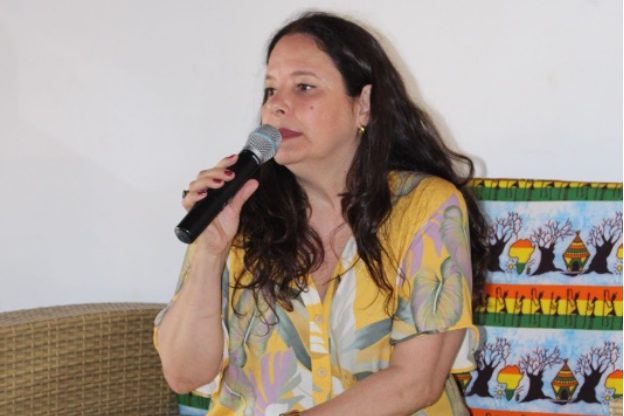The “Fla Sim pa Mudjer (Say Yes to Women, in English): Women together in the prevention of violence in Cape Verde” project in Cape Verde, Africa, was officially launched on 20 May 2022. The initiative, which won Womanity Foundation’s fourth Womanity Award, is the first step in a three-year international partnership between Themis Gender Justice and Human Rights (Brazil) and Associação Cabo-Verdiana de Luta contra a Violência Baseada no Género, – ACLCVBG (Cape Verde) to encourage legal empowerment for women and prevent violence against women and girls in the country.

Credit: Ekvity Dos Santos/ACLCVBG
The launch ceremony took place in the Cidade Velha (Old Town) Cultural Centre in Ribeira Grande de Santiago and was attended by local authority figures such as Joana Rosa, Cape Verde’s Minister of Justice. The Minister highlighted the importance of the initiative in counteracting “the deficit in terms of equal opportunities, particularly in relation to the participation of women in decision-making bodies, employment and other social areas.”
According to the Womanity Award Program Director, Laura Somoggi, the project’s launch in Cape Verde was very positively received. “Many of the key players in the Legal Empowerment Program have already shown their commitment, including the Minister of Justice. This is a very promising start to the partnership between Themis and ACLCVBG”, said Laura.
Executive Director of Themis, Márcia Soares knows that adapting the method for use in a new country can be challenging. “But we are absolutely convinced that it will create numerous opportunities. This is a joint construction project, drawing on our almost 30 years’ experience to set up the Grassroots Legal Assistance Program, a tool in helping create local ways of combatting domestic and family violence,” Márcia pointed out. She also explained that before it came to Africa, the project had already been adapted by 55 groups in 11 states in Brazil.

Credit: Ekvity Dos Santos/ACLCVBG
The partnership between Themis and ACLCVBG will allow the two organisations to combine their knowledge and experience, acting together to increase awareness of women’s rights and access to justice for women. Fla Sim pa Mudjer, which means “Say Yes for Women” in Creole, focusses on the prevention of domestic violence and its intersections with gender, race and class. Community activism by legally empowered women will help end gender inequality, prevent violence and promote the rights of women and girls in communities.

Credit: Ekvity Dos Santos/ACLCVBG
ABOUT THEMIS
Themis Gender Justice and Human Rights is a feminist and anti-racist organisation based in Brazil that educates women on their rights. They develop technologies for individuals to understand their rights and be more educated about the justice system. This organisation was founded in 1993, at a time when there was less knowledge on this issue. They were indeed drivers in the movement towards mitigating Gender-based Violence (GBV), as they proposed the Maria da Penha law in Brazil. The law subjects domestic abusers to greater consequences and punishments for their actions. Themis were also a driving force during the pandemic, creating a humanitarian programme to help those affected with food, health kits, as well as access to internet and mental health services. Their main strategic areas are: Legal empowerment, Defence of Rights, and Justice and Technologies.
ABOUT ACLCVBG
ACLCVBG is a non-profit non-governmental organisation based in Cape Verde (an archipelago of 10 islands in West Africa), that promotes gender equality and fights against GBV. They have been successful in promoting human rights and preventing discrimination and other forms of gender-based violence. Their support involves ensuring GBV victims are provided with access to financial and educational resources. They also ensure victims have quick access to emergency services, from legal assistance to medical support.
